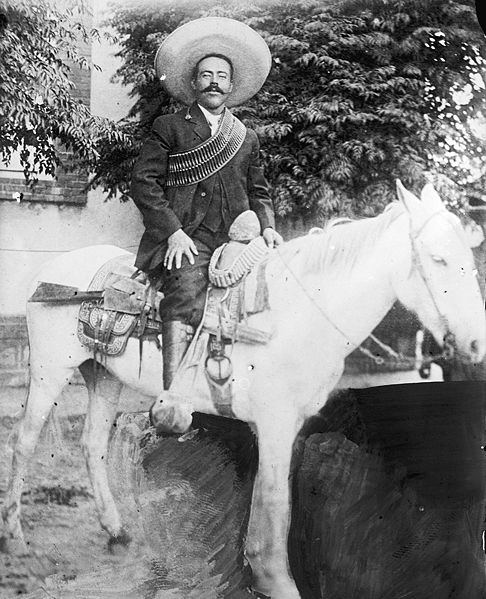 |
Craig White's Literature Courses Historical Backgrounds Pancho Villa & Mexico-USA Border Relations |
 |
1820-21 Mexican War of Independence from Spain
1910-1920s: Mexican Revolution (comparable to Civil War in USA to settle problems unresolved by Independence);
Mexican Revolution installs PRI
(Partido Revolucionario Institutional), centrist-socialist political party,
which holds power until 1997 & 2000 elections.

1910 President Porfirio Diaz (1830-1915; ruled 1876-1910) defeated by Francisco Melano (1873-1913; ruled 1911-1913)
1913 Melano deposed and assassinated by General Huerta (with support from US Ambassador)
1914
-
New U.S. President Wilson does not recognize Huerta as legitimate leader;
-
USA secretly supports Constitutionalist leaders Villa, Zapata, & others;
-
USA occupies Port of Veracruz to block German support of Huerta (concurrent with World War 1)
| Pancho Villa (1878-1923) Born to peasants in Northern Mexico, spends young manhood in border banditry Popular in Mexico and USA as cavalry leader for revolutionary forces 1913 meets U.S. General John Pershing in Texas 1915 Villa's forces decimated by rival forces at Battle of Celaya; USA halts supplies to Villa 1916 Villa's forces attack train, kill 18 Americans |
 |
 |
1916 Villa and army attack Columbus, New Mexico ←← 18 Americans killed, part of town burned 100 horses & mules + materiel taken from USA 13th Cavalry Villa loses app. 80 men 1916-17 Pancho Villa Expedition: 4800 U.S. Army soldiers led by Gen. Pershing enter Northern Mexico, fail to capture Villa 1923 Villa assassinated by political rivals |
![]()

Pancho Villa & E. Zapata at Presidential Palace,
1910s